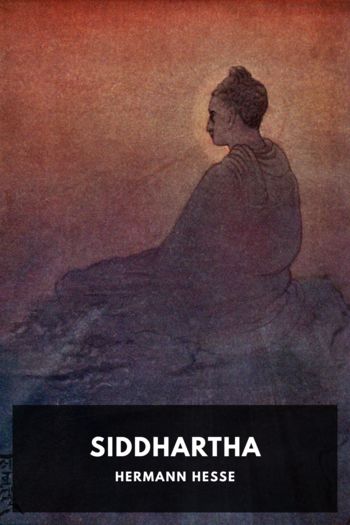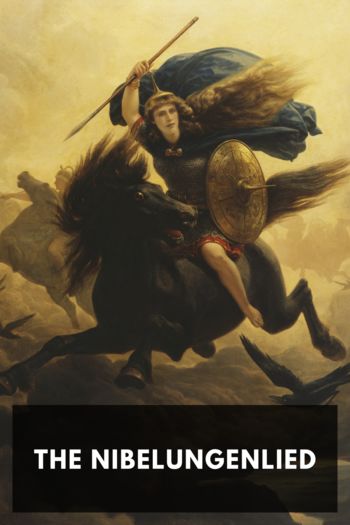Siddhartha, Hermann Hesse [free reads .TXT] 📗

- Author: Hermann Hesse
Book online «Siddhartha, Hermann Hesse [free reads .TXT] 📗». Author Hermann Hesse
As Govinda thought like this, and there was a conflict in his heart, he once again bowed to Siddhartha, drawn by love. Deeply he bowed to him who was calmly sitting.
“Siddhartha,” he spoke, “we have become old men. It is unlikely for one of us to see the other again in this incarnation. I see, beloved, that you have found peace. I confess that I haven’t found it. Tell me, O honourable one, one more word, give me something on my way which I can grasp, which I can understand! Give me something to be with me on my path. It is often hard, my path, often dark, Siddhartha.”
Siddhartha said nothing and looked at him with the ever unchanged, quiet smile. Govinda stared at his face, with fear, with yearning, suffering, and the eternal search was visible in his look, eternal not-finding.
Siddhartha saw it and smiled.
“Bend down to me!” he whispered quietly in Govinda’s ear. “Bend down to me! Like this, even closer! Very close! Kiss my forehead, Govinda!”
But while Govinda with astonishment, and yet drawn by great love and expectation, obeyed his words, bent down closely to him and touched his forehead with his lips, something miraculous happened to him. While his thoughts were still dwelling on Siddhartha’s wondrous words, while he was still struggling in vain and with reluctance to think away time, to imagine Nirvana and Sansara as one, while even a certain contempt for the words of his friend was fighting in him against an immense love and veneration, this happened to him:
He no longer saw the face of his friend Siddhartha, instead he saw other faces, many, a long sequence, a flowing river of faces, of hundreds, of thousands, which all came and disappeared, and yet all seemed to be there simultaneously, which all constantly changed and renewed themselves, and which were still all Siddhartha. He saw the face of a fish, a carp, with an infinitely painfully opened mouth, the face of a dying fish, with fading eyes—he saw the face of a newborn child, red and full of wrinkles, distorted from crying—he saw the face of a murderer, he saw him plunging a knife into the body of another person—he saw, in the same second, this criminal in bondage, kneeling and his head being chopped off by the executioner with one blow of his sword—he saw the bodies of men and women, naked in positions and cramps of frenzied love—he saw corpses stretched out, motionless, cold, void—he saw the heads of animals, of boars, of crocodiles, of elephants, of bulls, of birds—he saw gods, saw Krishna, saw Agni—he saw all of these figures and faces in a thousand relationships with one another, each one helping the other, loving it, hating it, destroying it, giving rebirth to it, each one was a will to die, a passionately painful confession of transitoriness, and yet none of them died, each one only transformed, was always reborn, received evermore a new face, without any time having passed between the one and the other face—and all of these figures and faces rested, flowed, generated themselves, floated along and merged with each other, and they were all constantly covered by something thin, without individuality of its own, but yet existing, like a thin glass or ice, like a transparent skin, a shell or mold or mask of water, and this mask was smiling, and this mask was Siddhartha’s smiling face, which he, Govinda, in this very same moment touched with his lips. And, Govinda saw it like this, this smile of the mask, this smile of oneness above the flowing forms, this smile of simultaneousness above the thousand births and deaths, this smile of Siddhartha was precisely the same, was precisely of the same kind as the quiet, delicate, impenetrable, perhaps benevolent, perhaps mocking, wise, thousandfold smile of Gotama, the Buddha, as he had seen it himself with great respect a hundred times. Like this, Govinda knew, the perfected ones are smiling.
Not knowing any more whether time existed, whether the vision had lasted a second or a hundred years, not knowing any more whether there existed a Siddhartha, a Gotama, a me and a you, feeling in his innermost self as if he had been wounded by a divine arrow, the injury of which tasted sweet, being enchanted and dissolved in his innermost self, Govinda still stood for a little while bent over Siddhartha’s quiet face, which he had just kissed, which had just been the scene of all manifestations, all transformations, all existence. The face was unchanged, after under its surface the depth of the thousandfoldness had closed up again, he smiled silently, smiled quietly and softly, perhaps very benevolently, perhaps very mockingly, precisely as he used to smile, the exalted one.
Deeply, Govinda bowed; tears he knew nothing of ran down his old face; like a fire burnt the feeling of the most intimate love, the humblest veneration in his heart. Deeply, he bowed, touching the ground, before him who was sitting motionlessly, whose smile reminded him of everything he had ever loved in his life, what had ever been valuable and holy to him in his life.
ColophonSiddhartha
was published in 1922 by
Hermann Hesse.
It was translated from German and released to the public domain in 2001 by
Gunther Olesch, Anke Dreher, Amy Coulter, Stefan Langer, and Semyon Chaichenets.
This ebook was produced for
Standard Ebooks
by
Alex Cabal,
and is based on a transcription produced in 2008 by
Michael Pullen, Chandra Yenco,





Comments (0)